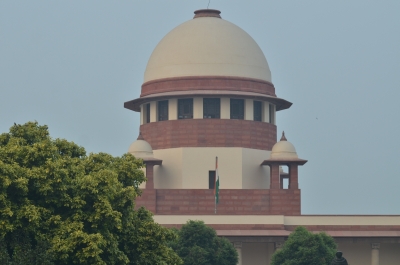SC: Difficult to have political will to deal with challenges of reservation
By IANS | Published: April 23, 2020 09:27 PM2020-04-23T21:27:50+5:302020-04-23T21:40:16+5:30
The Supreme Court has observed that despite more than 72 years of attaining independence, we are not able to provide benefits to the bottom line, and it seems very hard for any elected government to have political will to meet the challenges emerging from the reservation scenario, where there has been no review nor the provision of reservation have come to an end.

SC: Difficult to have political will to deal with challenges of reservation
New Delhi, April 23 The Supreme Court has observed that despite more than 72 years of attaining independence, we are not able to provide benefits to the bottom line, and it seems very hard for any elected government to have political will to meet the challenges emerging from the reservation scenario, where there has been no review nor the provision of reservation have come to an end.
The observation from the top court came in its 152-page verdict, which quashed the January 2000 order of the erstwhile state of Andhra Pradesh, providing 100 per cent reservation to the Scheduled Tribe candidates for post of teachers in schools in the scheduled areas.A A five-judge Constitution bench headed by Justice Arun Mishra and comprising Justices Indira Banerjee, Vineet Saran, M R Shah and Aniruddha Bose, noted a similar order was issued by the erstwhile state of Andhra Pradesh in 1986, which was quashed by a tribunal, and an appeal was filed in the apex court, which was dismissed as withdrawn in 1998.
"After withdrawal of the appeal from this Court, it was expected of the erstwhile State of Andhra Pradesh not to resort to such illegality of providing 100% reservation once again", said the court, citing reservation beyond 50% is not permissible. "There was no rhyme or reason with the State Government to resort to 100% reservation", added the court.
The apex court observed there are affluent and socially and economically advanced classes within Scheduled Castes and Scheduled Tribes. "There is voice by deprived persons of social upliftment of some of the Scheduled Castes/Tribes, but they still do not permit benefits to trickle down to the needy. Thus, there is a struggle within as to worthiness for entitlement within reserved classes of scheduled castes and scheduled tribes and other backward classes" said the court.
The top court observed that the reservation provided to scheduled tribes and constitution of scheduled areas is the reason as systems concerning way of life are different. The court noted they were in isolation, differed in various aspects from common civilization such as the delivery of justice, as regards legal system, the culture, way of life differs from the ordinary people, their language and their primitive way of life makes them unfit to put up with the mainstream and to be governed by the ordinary laws.
The bench said that the purpose of the constitutional provisions is not to keep them in isolation but to make them part of the mainstream. They are not supposed to be seen as a human zoo and source of enjoyment of primitive culture and for dance performances. "The benefits of developments have not reached them, and they remain isolated in various parts of the country. The social and economic upliftment and education are necessary for tribals to make them equal", said the court.
The bench said we are of the considered opinion that providing 100% reservation to the scheduled castes and scheduled tribes is not permissible. " The Governor in the exercise of the power conferred by para 5(1) of the Fifth Schedule of the Constitution, cannot provide a 100% reservation", said the court.
( With inputs from IANS )
Open in app